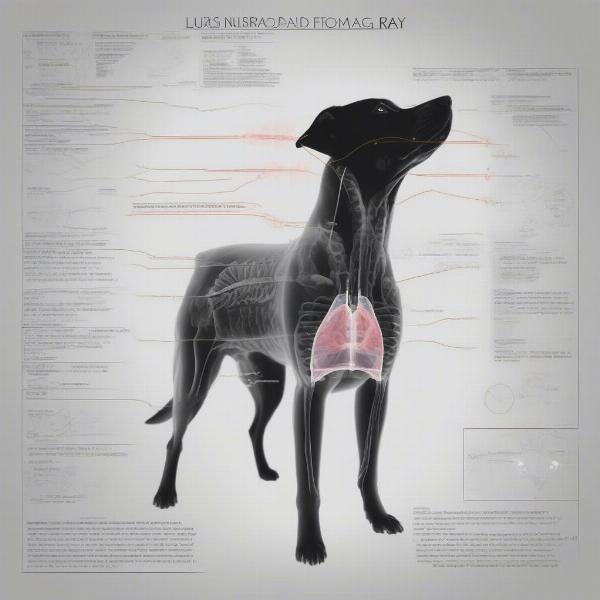Coughing and wheezing in dogs can be alarming for any owner. It’s important to understand that these symptoms can indicate a range of issues, from minor irritations to more serious health problems. Determining the underlying cause is key to providing effective treatment and ensuring your furry friend’s well-being. This article will explore the various reasons why your dog might be coughing and wheezing, offering insights into symptoms, diagnosis, and treatment options.
A cough is your dog’s natural reflex to clear their airways of irritants. Wheezing, on the other hand, is a high-pitched whistling sound produced during breathing, often indicating narrowed airways. While a single coughing episode might not be cause for immediate concern, persistent coughing and wheezing warrant a visit to the veterinarian. Several factors, such as allergies, infections, heart conditions, and even foreign objects, can contribute to these respiratory issues.
Common Causes of Coughing and Wheezing in Dogs
Several common conditions can lead to coughing and wheezing in dogs. Recognizing the associated symptoms can help you provide valuable information to your veterinarian.
Kennel Cough
Kennel cough, a highly contagious respiratory infection, is often characterized by a harsh, dry cough, sometimes accompanied by gagging or retching. Your dog might also exhibit other symptoms like a runny nose, sneezing, and lethargy.
Canine Influenza
Similar to the human flu, canine influenza can cause respiratory distress, including coughing, wheezing, and difficulty breathing. Other signs include fever, loss of appetite, and nasal discharge.
Allergies
Just like humans, dogs can suffer from allergies. Exposure to allergens like pollen, dust mites, or mold can trigger coughing, wheezing, and itchy skin.
Heart Disease
In some cases, coughing and wheezing, especially if worsened by exercise or occurring at night, can be a sign of underlying heart disease. Other symptoms may include reduced stamina, fainting, and abdominal swelling.
Collapsing Trachea
This condition, more common in smaller breeds, involves the weakening of the tracheal rings, leading to a narrowed airway. The characteristic “honking” cough, often triggered by excitement or pulling on the leash, is a key indicator.
Diagnosing the Cause of Coughing and Wheezing
If your dog is exhibiting persistent coughing and wheezing, it’s crucial to seek professional veterinary advice. Your vet will perform a thorough physical examination, listening to your dog’s lungs and heart. They may also recommend further diagnostic tests, such as blood work, chest X-rays, or bronchoscopy, to pinpoint the underlying cause.
When to Seek Immediate Veterinary Attention
While not all instances of coughing and wheezing require emergency care, certain signs warrant immediate attention. These include difficulty breathing, bluish gums, and collapse.
Treatment Options for Canine Respiratory Issues
The treatment for coughing and wheezing in dogs depends entirely on the underlying cause. For infections like kennel cough or canine influenza, antibiotics or antiviral medications might be prescribed. Allergies can be managed with antihistamines, corticosteroids, or allergen avoidance. Heart conditions may require lifelong medication and lifestyle adjustments. In cases of collapsing trachea, surgery might be necessary to stabilize the airway.
 Diagnosing Dog Cough – X-ray
Diagnosing Dog Cough – X-ray
Preventing Respiratory Problems in Dogs
While not all respiratory issues are preventable, certain measures can help reduce the risk. Vaccinations can protect against infectious diseases like kennel cough and canine influenza. Maintaining a clean and well-ventilated environment can minimize exposure to allergens and irritants. Regular veterinary checkups are essential for early detection and management of potential health problems.
Conclusion
Coughing and wheezing in dogs should never be ignored. While occasional coughing is normal, persistent or severe symptoms warrant veterinary attention. By understanding the potential causes, recognizing the signs, and seeking timely veterinary care, you can play a vital role in ensuring your dog’s respiratory health. Remember to consult with your vet for accurate diagnosis and treatment specific to your dog’s condition.
FAQs
- Is it normal for dogs to cough occasionally? Yes, occasional coughing can be normal, especially if it’s related to clearing their throat or after drinking water. However, persistent coughing is a cause for concern.
- What are the signs of a serious respiratory problem in dogs? Difficulty breathing, bluish gums, rapid breathing, weakness, and collapse are signs of a serious respiratory issue requiring immediate veterinary attention.
- Can I give my dog human cough medicine? Never give your dog human medication without consulting your veterinarian. Many human medications are toxic to dogs.
- How can I prevent my dog from getting kennel cough? Vaccination is the most effective way to prevent kennel cough. Limiting exposure to other dogs, especially in crowded environments, can also help.
- Is wheezing always a sign of asthma in dogs? No, wheezing can be caused by a variety of respiratory issues, including allergies, infections, and heart disease.
- How long should a dog cough last before I take them to the vet? If your dog’s cough persists for more than a day or two, or is accompanied by other symptoms, it’s best to consult a veterinarian.
- Can stress cause coughing and wheezing in dogs? While stress itself might not directly cause coughing and wheezing, it can weaken the immune system, making dogs more susceptible to respiratory infections.
ILM Dog is your one-stop resource for expert advice on all aspects of dog care, from breed selection and puppy care to senior dog health and behavior training. We offer valuable insights into dog health, nutrition, grooming, and product recommendations to help you provide the best possible care for your canine companion. For any concerns about your dog’s health or behavior, connect with our team of experts. Email us at [email protected] or call us at +44 20-3965-8624. ILM Dog is dedicated to helping you navigate the journey of dog ownership with confidence and joy.